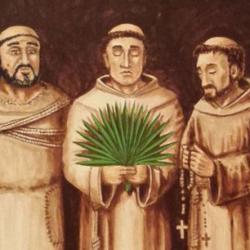Saint Paul to the Colossians 2:12-14
You were buried with him in baptism, in which you were also raised with him through faith in the power of God, who raised him from the dead. And even when you were dead in transgressions and the uncircumcision of your flesh, he brought you to life along with him, having forgiven us all our transgressions; obliterating the bond against us, with its legal claims, which was opposed to us, he also removed it from our midst, nailing it to the cross.
This passage from the Letter of Saint Paul to the Colossians contains the heart of what we believe of baptism as Catholics: what baptism is and what it does.
What is it that God the Father does at baptism? Why is it that Saint Paul speaks about its effect not only in this passage from Colossians, but writes much about it in his various letters? What does it mean that when we are baptized, we are buried and then given new life in Jesus Christ?
In the one year I have been your pastor, I have baptized twenty children and adults at Corpus Christi, and at Our Lady of Lourdes, between Father Carlos and I, we have baptized about forty. This is one of the greatest things that we do as a church – what exactly do we believe?
We oftentimes hear that baptism frees us from original sin or that it makes us part of God’s family; but Saint Paul, though he would agree with this, stresses over and over again that in baptism we die and rise again.
There was a tradition in parts of the ancient world that when an adult was baptized, the priest would get in the water with the person being baptized. The person should be dunked into the water, and his head would be kept underwater until the baptized almost ran out of breath. Then, he’d be allowed to rise and take a very deep breath. Then again “in the name of the Son, and in the name of the Holy Spirit.” As far as I know, this practice is no longer done anywhere in the church, but why was it done? It was done in recognition that there is a death and a new birth in baptism. The person being baptized was taken right to the point of death by drowning, and then they could take a deep, life-giving breath. In the Old Testament, we hear of the breath of God that gives life. The person being baptized experienced death and then life rushing into his or her lungs.
Saint Paul teaches that when we are baptized, we are united to Christ so intimately that we became one with Him. Through baptism have been united to Christ and especially in his death and resurrection. When a person is baptized, we are so intimately united to Christ that Christ shares with us everything that He is, and in that he shares with us the experience of death and new life. We die and rise to new life in Christ. We die to the presence of sin, to the hold of Satan, and to the presence of the darkness that looms over the world, and we are born new creatures redeemed by Christ. Whenever Jesus enters into a soul, His presence and light immediately dispel the presence of evil, sin and darkness. When we are baptized, that is what happens to the soul: Christ enters and remains, and everything that is not from God is dispelled.
We use water in baptism, which signifies what happens in baptism. Water is a power symbol and it has been throughout history. Water is a symbol for life; without water nothing grows and everything dies. But water as a symbol represents a paradox because it not only represents cleanliness and newness of life, but also death. Too much water brings destruction. Water is a symbol for death and life. As we enter into the waters of baptism, as Christ enters our souls and remains there, the water reminds us that there is a death to sin and a rebirth in newness of life.
Paul makes it clear throughout his letters that baptism is a death and resurrection, and because through our baptism we have already died and risen with Christ, and Christ has shared that reality with us, that whenever we face our earthly death, because we are so united to Christ through baptism, Jesus will allow us to experience the same resurrection He did. Through baptism we are baptized into the death and resurrection of Christ.
Baptism is what fills us with hope as Christians. Though we know of the certainty of dying, the day will come to all of us, baptism allows us to live with hope, and to approach our death with hope. Certainly, we are sad when we miss our loved ones, but we know that though we die like Christ, that he will raise us up to new life.
Yesterday afternoon I had a funeral Mass followed by a baptism. As priests we experience this all the time: the two parentheses of the Christian life – the beginning at a baptism and the end at a funeral. I was struck once again how the symbols of baptism are present at the funeral mass. When the body enters the Church for a funeral, the priest welcomes it with holy water, sprinkles it and prays, “in the waters of baptisms you died with Christ, may he now welcome you into eternal glory.” A reminder of the waters of baptism – what began then has brought you to the moment of death. Then a white pall is placed over the casket which symbolizes newness of life, in the same we were dressed in a white vestment at baptism. We clothe the body of the deceased in white to remind us of the promise of baptism. That what was promised at baptism, will now be granted. Finally, the Paschal Candle is placed next to the casket. That same candle is lit at a baptism to remind us of the words of Jesus, “I am the light of the world.” We are reminded that Christ, when he enters into the darkness and sin of the world, he dispels the presence of evil. The Paschal Candle reminds us that Jesus has come into our souls to redeem us. At a funeral Mass, we light the same candle to remind us that now the time has come for the promise to be fulfilled: the promise of eternal life.
We have all received the same promise from Jesus – eternal life. The reality of baptism, this intimate union with Christ, allows us to move forward with confidence in our lives, knowing that we belong to Him and that He is with us.
We pray today that we may be renewed in our baptism. That we may have a greater sense and greater hope in knowing that whenever we take our last breath, death will not have the final word, because those of us who have been baptized, though we die, will rise with Christ and live forever.
Picture used according to Creative Commons Attributions
















